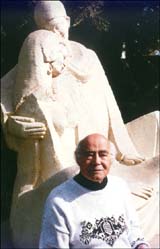The Victory Leap; Motherhood: Difference between revisions
No edit summary |
No edit summary |
||
| (4 intermediate revisions by 2 users not shown) | |||
| Line 1: | Line 1: | ||
====Date: [[:Category:2006 | ====Date: [[:Category:2006|2006]]==== | ||
====Region: [[:Category:Africa|Africa]]==== | |||
====Subject: [[:Category:Religious|Religious]] [[:Category:Political/Economic/Social Opinion|Political/Economic/Social Opinion]]==== | |||
====Medium: [[:Category:Sculpture|Sculpture]]==== | |||
====Medium: [[:Category:Sculpture|Sculpture | |||
---- | ---- | ||
[[File:Heshmat.jpg|right]] | |||
'''Artist:''' Hassan Heshmat | '''Artist:''' Hassan Heshmat (1920 - 2006) | ||
'''Confronting Bodies:''' Al-Azhar and its Dar El-Ifta, the Islamic Research Academy | '''Confronting Bodies:''' Al-Azhar and its Dar El-Ifta, the Islamic Research Academy | ||
'''Date of Action:''' May 2006 | |||
''' | |||
'''Location:''' Heshmat Museum, Egypt | '''Location:''' Heshmat Museum, Egypt | ||
'''Description of Artwork:''' Among the Hassan Heshmat statutes destroyed were ''The Victory Leap'' and ''Motherhood''. Heshmat made ''The Victory Leap'' in honor of the Egyptian troops that fought in the waar of 1973. <P> | |||
'''The Incident:''' Al Azhar and its Dar El-Ifta issue fatwas which are followed by devout Muslims. The fatwa in question, issued by Grand Mufti of Egypt Ali Gomaa, stated that Muslims cannot have statutes of living beings, especially of humans, in their homes. As a result of the fatwa, a Muslim woman destroyed some of Hassan Heshmat's statutes located at the Heshmat Museum. After being arrested, the woman said it was her responsibility to destroy the statutes. <P> | |||
'''Results of Incident:''' Because of this incident, Gomaa and the poet Ahmed Abdel Moeti Hagazi engaged in a debate on the Egyptian television show, El-Beit Beitak. Hagazi stated that "In Islam you are supposed to ask your heart for fatwa. No one is allowed to coerce a Muslim into choosing this or that. A Muslim must listen to the sheikhs, but is supposed to exercise freedom of choice at the end." Gomaa stated that the fatwa was based on the majority of the committee and not on his personal opinion. However, Muftis in the past have stated that statutes should not be considered haram (forbidden) which is why there was no fatwa in relation statues. The liberal intellectuals become alarmed whenever a fatwa is issued or a book is censored. In the liberal intellectuals' opinion, the actions of Al Azhar should promote tolerance and moderation because of their influence in the Muslim community. The liberal intellectuals also want the Mufti to update older fatwas to reflect modern societal values. Other liberal intellectuals, such as Salah Eissa and Soliman Fayyad, believe that Al Azhar is a political institution with much power and influence. <P> | |||
'''Results of Incident:''' Because of this incident, Gomaa and the poet Ahmed Abdel Moeti Hagazi engaged in a debate on the Egyptian television show, El-Beit Beitak. Hagazi stated that "In Islam you are supposed to ask your heart for fatwa. No one is allowed to coerce a Muslim into choosing this or that. A Muslim must listen to the sheikhs, but is supposed to exercise freedom of choice at the end." Gomaa stated that the fatwa was based on the majority of the committee and not on his personal opinion. However, Muftis in the past have stated that statutes should not be considered haram (forbidden)which is why there was no fatwa in relation statues. The liberal intellectuals become alarmed whenever a fatwa is issued or a book is censored. In | |||
'''Source:''' Egypt Today, www.egypttoday.com | '''Source:''' Egypt Today, www.egypttoday.com | ||
[[Category:2006]] | |||
[[Category:2000s]] | |||
[[Category: | [[Category:21st century]] | ||
[[Category:Africa]] | [[Category:Africa]] | ||
[[Category:Religious]] | [[Category:Religious]] | ||
[[Category:Political/Economic/Social Opinion]] | [[Category:Political/Economic/Social Opinion]] | ||
[[Category:Sculpture]] | [[Category:Sculpture]] | ||
[[Category:Hassan Heshmat, liberal intellectuals]] | [[Category:Hassan Heshmat, liberal intellectuals]] | ||
{{DISPLAYTITLE:<span style="font-style: italic;">The Victory Leap; Motherhood</span>}} | |||
{{DEFAULTSORT:Victory Leap; Motherhood, The}} | |||
__NOTOC__ | __NOTOC__ | ||
Latest revision as of 21:13, 15 January 2012
Date: 2006
Region: Africa
Subject: Religious Political/Economic/Social Opinion
Medium: Sculpture
Artist: Hassan Heshmat (1920 - 2006)
Confronting Bodies: Al-Azhar and its Dar El-Ifta, the Islamic Research Academy
Date of Action: May 2006
Location: Heshmat Museum, Egypt
Description of Artwork: Among the Hassan Heshmat statutes destroyed were The Victory Leap and Motherhood. Heshmat made The Victory Leap in honor of the Egyptian troops that fought in the waar of 1973.
The Incident: Al Azhar and its Dar El-Ifta issue fatwas which are followed by devout Muslims. The fatwa in question, issued by Grand Mufti of Egypt Ali Gomaa, stated that Muslims cannot have statutes of living beings, especially of humans, in their homes. As a result of the fatwa, a Muslim woman destroyed some of Hassan Heshmat's statutes located at the Heshmat Museum. After being arrested, the woman said it was her responsibility to destroy the statutes.
Results of Incident: Because of this incident, Gomaa and the poet Ahmed Abdel Moeti Hagazi engaged in a debate on the Egyptian television show, El-Beit Beitak. Hagazi stated that "In Islam you are supposed to ask your heart for fatwa. No one is allowed to coerce a Muslim into choosing this or that. A Muslim must listen to the sheikhs, but is supposed to exercise freedom of choice at the end." Gomaa stated that the fatwa was based on the majority of the committee and not on his personal opinion. However, Muftis in the past have stated that statutes should not be considered haram (forbidden) which is why there was no fatwa in relation statues. The liberal intellectuals become alarmed whenever a fatwa is issued or a book is censored. In the liberal intellectuals' opinion, the actions of Al Azhar should promote tolerance and moderation because of their influence in the Muslim community. The liberal intellectuals also want the Mufti to update older fatwas to reflect modern societal values. Other liberal intellectuals, such as Salah Eissa and Soliman Fayyad, believe that Al Azhar is a political institution with much power and influence.
Source: Egypt Today, www.egypttoday.com
